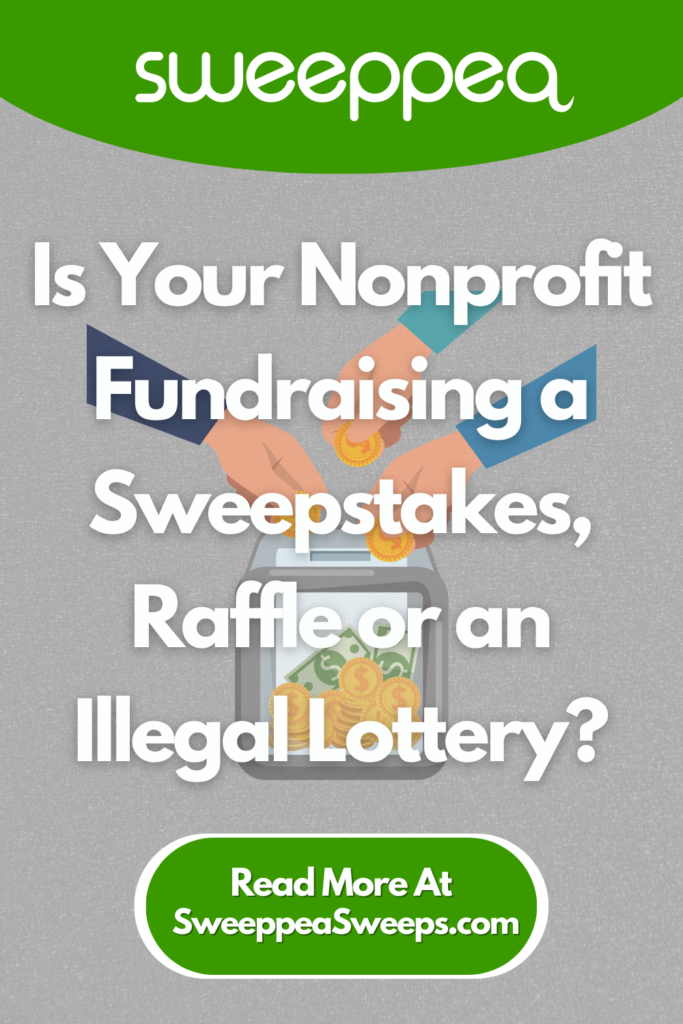
Nonprofit fundraising is an important way to raise money for a good cause. However, it’s important to make sure that you are legally compliant when you are raising money.
Many nonprofit promotions take the form of sweepstakes or raffles, but there is a big difference between the two. In this article, we will discuss the difference between sweepstakes and raffles for nonprofits, and explain when a nonprofit promotion becomes an illegal lottery.
Sweepstakes vs Raffle for Nonprofit
Sweepstakes are games of chance where a prize is awarded to a lucky winner chosen at random. Raffles are different from sweepstakes because they involve the sale of tickets, and the winners are chosen through a random drawing. The key difference between these two promotions is that raffles require participants to purchase tickets, while sweepstakes do not.
There are cases where businesses are interested in running purchase-to-enter sweepstakes. They can be legally compliant if the legal aspects of the sweepstakes are correctly managed. For more information, check out our article on No Purchase Necessary Laws.
Nonprofit Raffle
A nonprofit raffle is a fundraising effort that involves the drawing of lots to select a winner or winners if there are several prizes. An online raffle (also known as an electronic raffle) uses computers and technology for ticket sales, winner selection, and prize delivery.
A traditional raffle (also known as an offline or in-person raffle) involves the distribution of physical tickets on-site for a few hours during an event. The primary difference between online and conventional raffles is online raffles have their entire process online. This includes setting up a landing page with accessible payment options for ticket purchases and a digital prize.
In The United States, just like in many other countries, only nonprofit entities can run raffles.
Raffles are legal with various restrictions in 47 of the 50 states. The 3 states that prohibit raffles altogether are Alabama, Hawaii, and Utah.
For more information on the difference between sweepstakes, raffle, and a lottery check out What’s the Difference Between a Sweepstakes, Contest, Game, Raffle and Giveaways and Which is More Popular?
Nonprofit Sweepstakes
Sweepstakes are similar to raffles in 2 ways: random selection of winners and distribution of prizes. The major distinction between them is in the method of entry. A participant does not have to purchase in order to enter a sweepstake—this is why sweepstakes are not considered gambling and can be offered throughout all 50 states.
When running a sweepstake, there are a few laws you need to pay attention to. Multiple agencies, including the FTC (Federal Trade Commission), USPS (United States Postal Service), FCC (Federal Communications Commission), and several state agencies regulate sweepstakes and giveaways.
No Purchase Necessary laws state that you cannot ask entrants to make a purchase or provide some other form of consideration for entry. By offering sweepstakes, you may entice participants to donate as the primary point of entry as long as there is an alternate method of entry that does not require donations..
An alternate means of entry (AMOE) could be:
- An online entry form
- A mail-in entry
- An email entry
- A text message or phone entry
- Via social media platforms like Facebook, Instagram, or Twitter
- In-person entry at stores, offices, or events
Is Your Nonprofit Fundraising an Illegal Lottery?
In the United States, only the government can run lotteries. They have both federal and state regulations in place for lotteries and must comply with the following:
- A prize with monetary value
- Luck. The outcome of the campaign is not dependent on skill.
- “Consideration.” An entrance fee is required. This payment may be money or anything else that takes a significant amount of time away from the entrant or provides a benefit to the promotion’s sponsor.
So, what happens when nonprofits try to combine elements of both sweepstakes and raffles?
This is where things can get tricky, and it’s important to understand the law before you launch your promotion. If your nonprofit promotion involves the sale of tickets AND an element of chance, it will be considered an illegal lottery.
However, there are some exceptions to this rule. For example, if the prize is awarded based on skill, rather than chance, then your promotion may be considered a contest and not a lottery.
Here are some examples:
- Sweepstakes: Sweepstakes aren’t classified as lotteries since there is no purchase necessary to enter—only a prize and luck.
- Contests: Although most contests provide a prize and consideration, they are not luck-based. True contests are trials of skill, which removes the element of chance from the equation.
- Raffles: Raffles are a gray area and are seen as lotteries in certain states.
Conclusion
Promotions are a great way to raise money for your organization, but they can also create issues, especially if they aren’t structured properly under federal and state regulations.
If you are unsure whether or not your nonprofit fundraising is sweepstakes, raffle, or illegal lottery, it’s always best to consult with an experienced sweepstakes administrator like Sweeppea. This will ensure that you are following the law and that your promotion is fair and legal. Need help with sweepstakes or contest management? Call 305-505-5393 or email us with your questions.

